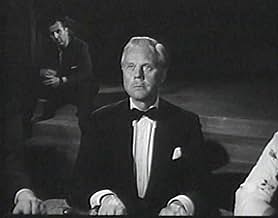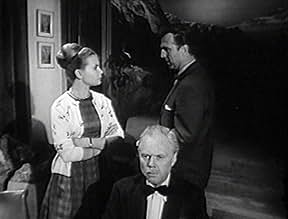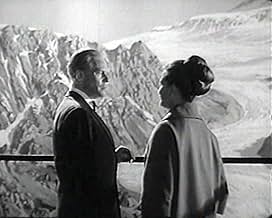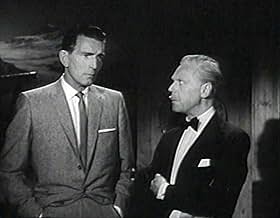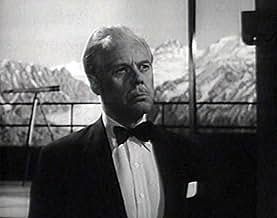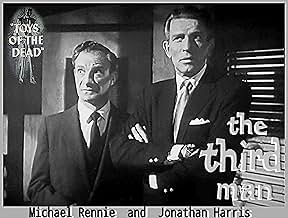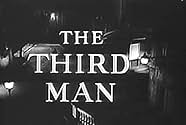Harry Lime makes money dealing art and solves crime to save his life.Harry Lime makes money dealing art and solves crime to save his life.Harry Lime makes money dealing art and solves crime to save his life.
Browse episodes
Featured reviews
This serial is notable for two things;
1) Orson Welles was so annoyed that he wasn't entitled to any money from this series (he felt he "owned" the character of Harry Lime) that he released a radio series, called "The Lives Of Harry Lime", based on the adventures of Lime before the events of "The Third Man" novel and movie, as a spoiler operation; his version of Lime was more like the character Welles portrayed in the movie "The Lady From Shanghai" than Graham Greene's sleazy spiv.
2) According to Emlyn Williams, in his book "Beyond Belief" about the British 1963-65 "Moors Murders", the killer Ian Brady, when questioned by the prison psychiatrist, on why he committed the murders, claimed that the TV series made him do it, that he "wanted to be like Harry Lime".
Harry Lime in the 1949 movie is a charming, totally amoral character. In the 1951 radio series, (an episode of which can be heard on the Criterion Collection DVD of the film), which also starred Orson Welles, he is a charming adventurer of dubious reputation who is not as ammoral as people think he is. In the TV show, as played by Michael Rennie, he's a rather conservative businessman whose reputation seems to have been a case of mistaken identity.
I would love to have seen Welles essay the role in the TV show. It would have made all the difference. But of course, he didn't do TV series. One wonders who might have been more interesting than Rennie who was doing TV at that time. The name, (and face) that pops into my mind is Ross Martin but perhaps he was not a big enough star yet. At least Jonathan Harris provides some liveliness as Lime's persnickety assistant, although one can hardly imagine Welles' Lime finding a use for such a character. Also, in a half hour show his intrusions often detract from the story too much.
I will say that I like the way the show was filmed, with some good camera angles, clever editing and, of course, Anton Karras' musical theme, which never seems to stop playing. It's still not a patch on the movie but what TV series is?
I would love to have seen Welles essay the role in the TV show. It would have made all the difference. But of course, he didn't do TV series. One wonders who might have been more interesting than Rennie who was doing TV at that time. The name, (and face) that pops into my mind is Ross Martin but perhaps he was not a big enough star yet. At least Jonathan Harris provides some liveliness as Lime's persnickety assistant, although one can hardly imagine Welles' Lime finding a use for such a character. Also, in a half hour show his intrusions often detract from the story too much.
I will say that I like the way the show was filmed, with some good camera angles, clever editing and, of course, Anton Karras' musical theme, which never seems to stop playing. It's still not a patch on the movie but what TV series is?
This is a series of short programs that are loosely based on Le Troisième Homme (1949). The British T. V. series uses the same theme music as the movie. In the first box e only get 10 of the 77 episodes from January 23,1959 until August 27,1965.
This time Michael Rennie(1909-1971) is Harry Lime with his sidekick Jonathan Harris(1914-2002) as Bradford Webster.
1. The Third Medallion It was surprising to see all the actors as you watch the story unfold. At first, they will overpower the characters they are playing. Given the nature of the show, I should have planned on Werner Klemperer.
Watch as Harry pulls a rabbit out of the hat at the last moment to wrap up the mystery.
2. A Pocketful of Sin By now we realize that Jonathan Harris is with us to stay as Lime's assistant Bradford Webster. He makes all the faces and jesters that you found him in "Lost in Space." This review would be too long if I were to identify all the almost fifty recognizable actors in the series. Some very phony French accents.
Tricky ending but not that tricky as you are thinking.
The balance of the programs is technically the same formula. If you enjoyed the first two episodes you will enjoy the balance.
This time Michael Rennie(1909-1971) is Harry Lime with his sidekick Jonathan Harris(1914-2002) as Bradford Webster.
1. The Third Medallion It was surprising to see all the actors as you watch the story unfold. At first, they will overpower the characters they are playing. Given the nature of the show, I should have planned on Werner Klemperer.
Watch as Harry pulls a rabbit out of the hat at the last moment to wrap up the mystery.
2. A Pocketful of Sin By now we realize that Jonathan Harris is with us to stay as Lime's assistant Bradford Webster. He makes all the faces and jesters that you found him in "Lost in Space." This review would be too long if I were to identify all the almost fifty recognizable actors in the series. Some very phony French accents.
Tricky ending but not that tricky as you are thinking.
The balance of the programs is technically the same formula. If you enjoyed the first two episodes you will enjoy the balance.
"The Third Man", at first glance, would seem an odd choice of movie to adapt into a television series. The Carol Reed-directed 1949 thriller, was, after all, about a notorious criminal, Harry Lime, and his plot to convince Interpol and the Vienna police that he was dead, to allow him to continue his corrupt activities. A film rich in atmosphere, with an unforgettable sewer chase finale, and a haunting, yet lilting zither theme, it seemed to offer little to hinge a television program on.
But the BBC was enjoying a 'rebirth' in the 1950s, aided by a large input of American money from the use of British studios and production companies (for tax purposes, many American studios utilized British facilities, throughout the decade), and as the British studios became stronger, the quality of the television product being offered to the BBC improved, as well. "The Third Man" was actually an ideal candidate for television, as it had been a world-wide success, and, as it had offered American actors Orson Welles and Joseph Cotton in the leads, a series based on the film opened a door to a potential American market that few other British film titles could match.
Of course, Welles and Cotton would never agree to star in a weekly series, but in the retooled format of "The Third Man" (involving the international 'Robin Hood'-like escapades of a wealthy 'art dealer' with an obligation to Interpol, and his associate/friend), the BBC was able to utilize the services of Michael Rennie as a 'kinder and gentler' Harry Lime. Rennie was very familiar to audiences on both sides of the Atlantic, having starred as 'Klaatu' in the classic THE DAY THE EARTH STOOD STILL, as well as the Christian leader, Simon Peter, in THE ROBE. His Harry Lime possessed a wry sense of humor, a strong code of honor, and a naughty habit of 'tweaking' law enforcement noses while pulling off his capers (qualities that would be 'inherited' by Simon Templar when "The Saint" became a weekly series, in 1962).
The true pleasure of the "The Third Man", however, was watching Lime's loyal, if somewhat cowardly assistant, Bradford Webster, portrayed to perfection by Jonathan Harris. Webster had the aplomb of a Clifton Webb, but the ineptitude of Nigel Bruce's 'Dr. Watson', and Harris was so endearing in the role that he recreated virtually the same character as 'Dr. Zachary Smith' in "Lost in Space", which debuted shortly after "The Third Man" completed production. Rennie and Harris had a warm, wonderful chemistry together, and made each episode a delight.
As with nearly all of the 'international' shows of the 50s and 60s ("I Spy" was the only exception), the episodes were shot in the studio or on the back lot, with set 'dressing' and costumes creating the exotic flavor of the 'foreign' locales. While this tends to make the episodes appear 'low budget', today, to the audiences of the time, it was all wonderful escapism. And that theme song is ageless!
If "The Third Man" reappears on a 'nostalgia' channel, check it out...it is really a very entertaining series!
But the BBC was enjoying a 'rebirth' in the 1950s, aided by a large input of American money from the use of British studios and production companies (for tax purposes, many American studios utilized British facilities, throughout the decade), and as the British studios became stronger, the quality of the television product being offered to the BBC improved, as well. "The Third Man" was actually an ideal candidate for television, as it had been a world-wide success, and, as it had offered American actors Orson Welles and Joseph Cotton in the leads, a series based on the film opened a door to a potential American market that few other British film titles could match.
Of course, Welles and Cotton would never agree to star in a weekly series, but in the retooled format of "The Third Man" (involving the international 'Robin Hood'-like escapades of a wealthy 'art dealer' with an obligation to Interpol, and his associate/friend), the BBC was able to utilize the services of Michael Rennie as a 'kinder and gentler' Harry Lime. Rennie was very familiar to audiences on both sides of the Atlantic, having starred as 'Klaatu' in the classic THE DAY THE EARTH STOOD STILL, as well as the Christian leader, Simon Peter, in THE ROBE. His Harry Lime possessed a wry sense of humor, a strong code of honor, and a naughty habit of 'tweaking' law enforcement noses while pulling off his capers (qualities that would be 'inherited' by Simon Templar when "The Saint" became a weekly series, in 1962).
The true pleasure of the "The Third Man", however, was watching Lime's loyal, if somewhat cowardly assistant, Bradford Webster, portrayed to perfection by Jonathan Harris. Webster had the aplomb of a Clifton Webb, but the ineptitude of Nigel Bruce's 'Dr. Watson', and Harris was so endearing in the role that he recreated virtually the same character as 'Dr. Zachary Smith' in "Lost in Space", which debuted shortly after "The Third Man" completed production. Rennie and Harris had a warm, wonderful chemistry together, and made each episode a delight.
As with nearly all of the 'international' shows of the 50s and 60s ("I Spy" was the only exception), the episodes were shot in the studio or on the back lot, with set 'dressing' and costumes creating the exotic flavor of the 'foreign' locales. While this tends to make the episodes appear 'low budget', today, to the audiences of the time, it was all wonderful escapism. And that theme song is ageless!
If "The Third Man" reappears on a 'nostalgia' channel, check it out...it is really a very entertaining series!
Did you know
- TriviaOne of the first (if not the first) examples of cross nationality television co-productions. This would go on to become more popular over the next coming decades for big budget television shows in order to spread the cost.
- ConnectionsFeatured in Never Fear Smith Is Here! (1994)
- How many seasons does The Third Man have?Powered by Alexa
Details
- Release date
- Country of origin
- Language
- Also known as
- Trzeci człowiek
- Filming locations
- Production companies
- See more company credits at IMDbPro
- Runtime30 minutes
- Color
- Aspect ratio
- 1.33 : 1
Contribute to this page
Suggest an edit or add missing content


